Still not doing well at this blog… but you never know in the future…
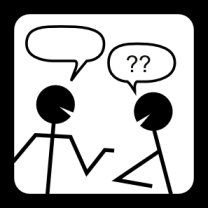 Anyway in the meantime, I have started another blog specifically about learning Runyankore so if you are interested you can check it out here:
Anyway in the meantime, I have started another blog specifically about learning Runyankore so if you are interested you can check it out here:
Still not doing well at this blog… but you never know in the future…
 Anyway in the meantime, I have started another blog specifically about learning Runyankore so if you are interested you can check it out here:
Anyway in the meantime, I have started another blog specifically about learning Runyankore so if you are interested you can check it out here:
Posted in Uncategorized
Today we are planning to have a meeting to pray for the new Physiotherapy Degree programme starting in August.
If you are someone who prays, then please could you pray with us for the course (it doesn’t have to be today!!)… some prayer requests are listed here:Physio Prayer Requests
Posted in Uncategorized
Well I have time to write as I am laid up in bed with a fever, aches, headache and some painful bites… all thanks to some unknown creature who decided the left side of my body was quite tasty a few nights ago. Frustratingly I don’t know what creature it was… We’ve ruled out mango fly and mosquito (thankfully I am clear for malaria), so that leaves a multitude of other random biting flies and spiders. That means any due revenge on the creature (or its family member) is not possible. Oh well hopefully the antibiotics and my body’s natural defences will do their job soon and I’ll be up on my feet again. I decided against posting pictures as this episode will be gratefully forgotten as soon as possible.
Anyhow I have another creature to keep me entertained while I lie here (and a friend to my other dog Quest)… an eight week old puppy called Rafiki. He was found 5 weeks ago crying, obviously abandoned, in a banana plot belonging to some friends. As a then 3 week old, he was blind, deaf and could barely walk. It has been fun (and a little tiring) caring for him up to this point but now he is at least at the age a puppy would normally be allowed away from him mum!
I am so grateful to the Skinners and Hollenbecks who kindly babysat him during the first few weeks while I was at work… couldn’t have done it without you guys!
I could tell you stories about having a small black excitable dog in power cuts and particularly a small excitable black dog, with diarrhoea, in power cuts, but best probably to leave out those graphic details! Here are some photos of my little friend because he is too cute not to share:
“The earth is the Lord’s and everything in it” Psalm 24vs 1
Posted in Uncategorized | Tags: pets
OK, in my last post I mentioned how I was still learning (and will be indefinitely). One thing is learning what words mean here. Yes it is English but it is different from English English or American English (if you can call that English!!!) – here I am learning Ugandan English.
I’ve mentioned before about how “let me come” means I will come in a bit but for the moment I am heading in the other direction. There are lots more and if you are interested then wikipedia has a whole article devoted to Ugandan English here http://en.wikipedia.org/wiki/Ugandan_english.
The one that I am trying hard to get in my head is “May” and “Knew”. Now I am happy for any Ugandans to correct me on this, but from what I have seen so far… If someone says “I may” it means “I am not” (i.e. if someone says “I may not come” that means “I am not going to come”) and if someone says “I knew” it means “I thought” (i.e. if you have a meeting and someone doesn’t come to it, they may say to you “I knew you were not meeting” meaning “I thought you were not meeting”).
Now who is to say one is the right way and one is the wrong way. In fact when I am in Uganda, it surely should be the Ugandan English that is correct. However my head does hurt when I hear someone say something that my brain interprets as an indefinite and try to convince myself it is a definite and vice versa.
Posted in Uncategorized | Tags: Culture, Musings
I haven’t posted in this blog for almost a year – why? Well partly because I haven’t had a lot of time and partly because I became so conscious of the fact that I didn’t want my friends here to feel that I was treating my life with them as an ‘adventure’ or a ‘project’ or to give the impression I thought I had the answers to the problems they face.
The truth is that I feel none of the above. If I was here for the adventure then I would have left by now, yes there are still many new experiences, but there are just as many days when I get up, go to work, cook, clean etc… Rather than seeing it as a project, I am just here living alongside friends, learning from these friends how to function best in this culture, serving the same God. Yes we have projects, but we are doing them together. And as for the having the answers…I think I am still learning what the questions are!
I know my family and friends outside Uganda find this blog helpful for somehow understanding my life is like here and therefore I am going to try and write sometimes. But if I ever mistakenly communicate that I am an expert having an adventure doing a project in Africa… then please tell me and I’ll sort myself out!
Posted in Uncategorized | Tags: Musings
One thing that has been strange for me is to no longer get chance to see patients in their home environment (the hospital currently doesn’t have the available funds or staffing to enable that). However this last week gave me to opportunity to discover a bit more about disability in the community and the factors affecting rehabilitation.
A group of healthcare students from Sweden have been visiting and as six of them were physio/OT students, our department has been heavily involved. As a result my colleagues and I had to make several visits to a village area about 2 hours away where the students were doing a field study. This area was in a fantastic location, just on the edge of Queen Elizabeth National Park and we were told that the people we were visiting often had problems with their crops being destroyed by wild animals (this park has plenty of elephants, lions and baboons).
Our pre-visit to meet the patients involved me doing the driving into the areas. I was very grateful for my 4 wheel drive as I was directed up what would barely be called a footpath in the UK. We would drive as far as we could and then get out and walk the rest of the distance. Considering we were visiting people with disabilities who usually would not be able to afford transport, it was a very telling reminder of how isolated these people can be and why they may not be seen at the hospital.
We met 5 people with disabilities, all in different situations. All fantastic people who were dealing with their situation in amazing ways, all causing me (and my colleagues) a sense of frustration when you know how different interventions could help and there being no easy, quick fix, answers about how to make them accessible for them.
These were the people we met (names changed for confidentiality):
David & Andrew (brothers). David is 16 and has a foot deformity. It was caused by a inappropriate injection when he was 5, which lead to paralysis in his lower limb. Without any advice, aids or treatment he just carried on walking on it. It is now fixed so that he almost walks on the top part of his foot, an operation is a very risky option (high chance it may result in an amputation), he can’t get to school or to see his friends because of pain and a wheelchair is not an option in the environment where he lives.
Andrew is 18 and has a mental disorder caused by convulsions when he was an infant. He can’t look after himself, tends to hit the younger children when attempting to play and recently has started having some more convulsions. My colleagues explained that if he was not mobile it would be likely that he would have been kept unseen within the house or not have survived to live this long.
Peter is 5 and had Cerebral Malaria 3 years ago. He developed a left hemiplegia and can no longer use his hand. He can walk with a limp and is determined to join in the everyday tasks of the family. He tries to dig using his good hand and helps with untying the goats. He is going to school although taunted by the other children.
Mary is about 25 and has congenital deformities. She is unable to walk or use her legs. She moves by using two pieces of sacking. She lifts herself onto the front one and then moves the other piece forwards (to protect her clothes from the dirt floor), she has a wheelchair but it wouldn’t work around her home. She makes crafts, helps with the cooking and can use the toilet independantly thanks to the long drop style (floor level) type of latrines they have here. Of all the people we met she was the most content and well integrated, but even she expressed a desire to return to vocational school to learn a craft trade and told us she had not been to the nearby town for a year because of the stigma she got there.
Finally Mercy was a widow in her 40s with 3 children in their late teens. She developed Rheumatoid Arthritis 11 years ago and after a few month in hospital returned home without knowing hardly any information about her condition. Expecting it to get better she took to her bed and waited. 10 years later she now has many contractures, is unable to sit without assistance, no chance of standing again and only moves out of her bedroom when her children are home during the holidays.
As we worked with the Swedish students, we came up with many intervention ideas for all these patients. However the difficulty is that we have no rehabilitation service provision that can reach these people and them reaching us is practically and financially out of the question for most of them. It was difficult to drive away not being able to guarantee any follow up.
On a positive note travelling to and from these villages gave plenty of opportunities for discussion. As I said before there are no quick fixes however Mbarara University is working hard at looking at how to improve health services at a community level and the momentum is in the right direction. There are already volunteer community health workers in each of the villages we visited and training of these workers certainly seems a first step. In the meantime please pray for these families that we left behind.
Posted in Uncategorized
The availability of resources at our hospital is a challenge. There are many reasons why this may be and there are no simple solutions. It is extremely frustrating for the staff (although they are often remarkable in the way they cope with it) and patient care is obviously compromised.
One way of managing this is requesting patients to purchase necessary items, however this is not always possible as patients and their families often have very limited funds. This method also requires patients to see the value in the treatment. When that is applied to items needed for Physiotherapy/Occupational Therapy that can mean there is no possible way to provide them. (People here often prefer injections/creams to other methods of treatment). For example a patient with a Severe Head Injury who is at risk of developing hand contractures who would benefit from a hand resting splint.
My friend Grace, who is an occupational therapist, visited for a few weeks recently and this was a great opportunity to discuss (along with our OT/Physio colleagues at the hospital) and trial alternative options.
I was really impressed with her ingenuity and know she’ll hate me for posting pictures of her but here we are any way (until she asks me to remove them!):
First attempt was a splint made out of Banana plant – a piece of stalk for the hand and bark for the arm bit:
This worked great as a temporary splint but it was difficult to maintain a fixed position and obviously concerns about skin care.
The second attempt involved trying to make a salt dough mould to then make a paper mache splint on, unfortunately the dough changed shape in the oven!!
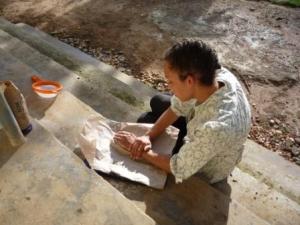
The final attempt involved making a paper mache splint using a human model. A long process but it worked well.
The paper mache was initially made using maize flour – just the slight problem that this is also what is used as dog food here, so there was one episode of needing to extract it from a dog mouth!! In the end Grace discovered that millet/Cassava flour worked the best. (Ivan, the OT at the hospital, suggests that just cassava flour is good, but we didn’t have any of that to try).It took a few days of moulding/remoulding/reinforcing and then varnishing but the end product was great. (Grace will express concerns about some aspects of it but I still thought it was fab!!)
Here it is on the patient:
Sadly the patient was discharged home shortly after this (unexpected discharges is a big thing that the rehab team have to contend with here) and so we don’t know the outcome but the family members seemed really on board with the idea and certainly the time taken over it will hopefully have reinforced to them the importance of hand care.
Posted in Uncategorized
Well I am sat waiting for a friend to arrive from the UK and as I view the prospect of a holiday in a few weeks time, I thought it was about time I posted a few photos of my last holiday as I promised long ago…
We went to Fort Portal for a few days which is North West of Mbarara.
Our Campsite was at Amabeere Caves…
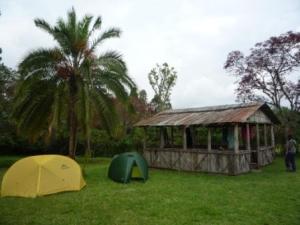
Here are the caves.. “Amabeere” means “breasts” in the local language and gets its name from the strange stalactite formations… decided to save you those photos but safe to say it was rather surreal having the guide point them all out!
One day we went on a trip round the foothills of the Rwenzoris… very fun drive!!
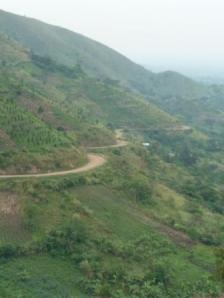
We were heading to Semuliki National Park which is on the Congo border and has lots of amazing birds and hot springs…
We then moved South to a “crater lake” area where we went swimming…
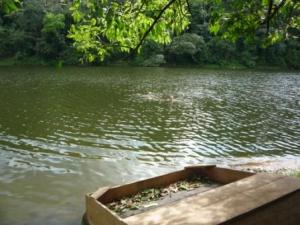
Of course no trip here is complete without the sights you see while travelling.
The driving school (having seen some of the driving “in his mercy” sounds about right!!)…
The comfy way to travel (although not sure they were too impressed with having their photo taken!!)
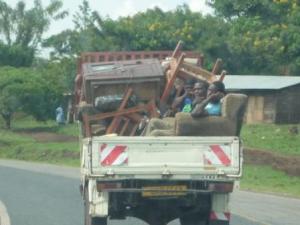
The matoke (green bananas) carrier (very common sight here). The guys who push these must be very fit – they often go miles,up and down hills.
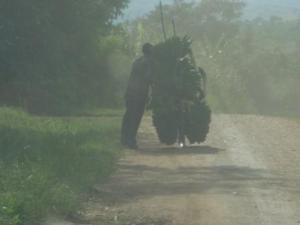
Posted in Uncategorized
I recently found a facebook group called “You know you’ve been in Uganda too long when…”. Whether being here a year counts as “too long”, nevertheless here are some of my favourites that ring completely true…
and adding one of my own:
Posted in Uncategorized